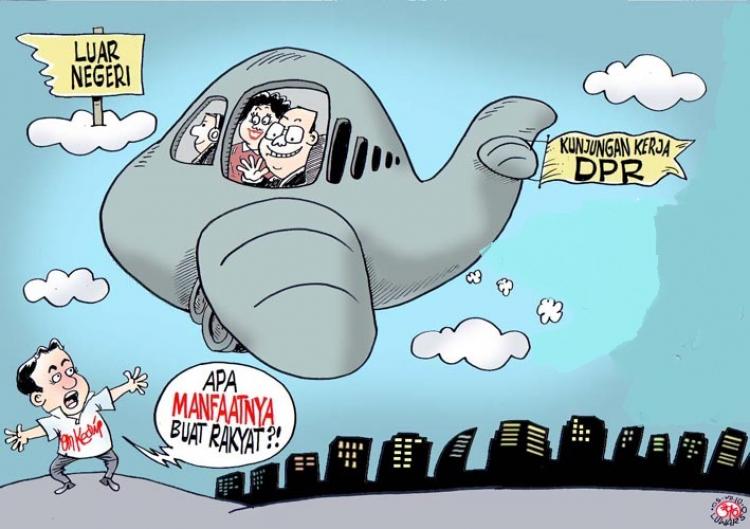Election Bill Special Committee Working Visit: A waste of public funds?

Once again, DPR members wasted public funds. This time, the special committee on the Simultaneous Election Bill (Election Bill Special Committee), is conducting a working visit to Germany and Mexico on 11 to 16 March. Germany has been selected as an example of the use of e-voting, while Mexico has a special judicial body dealing with election issues.
DPR Regulation No. 1 of 2014, Article 145, explains that in the framework of the preparation of a bill, a special committee can conduct a working visit abroad, using the DPR budget and approved by the House leader. However, such a visit must satisfy three aspects: urgency, usefulness and relevance of the country of destination with the material of the Bill.
Considering the deadline for ratification of the Simultaneous Election Bill is no later than April or May, the working visits to the two countries are not efficient and effective in terms of time and cost. First, since the appointment on 28 October 2016 (https://news.detik.com/berita/d-3331685/ini-susunan-anggota-pansus-ruu-penyelenggaraan-pemilu-di-dpr), the special committee chaired by Lukman Edy has only discussed 77 of a total of 2885 points from the inventory list of election administration issues (Kompas Cetak, 1 March 2017, Pimpinan DPR Akan Evaluasi). Among the issues remaining to be discussed are the possibility of e-voting, the parliamentary threshold, the presidential threshold, conversion of votes to legislative seats, and the choice of open proportional or closed proportional legislative electoral systems. As there are many things that need to be discussed, a working visit seems frivolous.
Second, the working visit to be undertaken by the special committee will only be for three days, not including travel days. In such a short period, it is presumed that the committee would not be able to explore much information about the electoral systems in the countries visited. Not to mention the formal meetings and receptions that have to be attended by the special committee. Third, although not all members of the committee participated in the working visits, there is no guarantee for the committee members who remain in Jakarta will continue to discuss the election bill, because the House is in recess until 14 March.
Fourth, the budget spent on the working visits is certainly not insignificant. Although there is as yet no information regarding the amount of the budget for the working visits, it is certain that the information obtained from the visits would not be comparable to the expenses spent. Basically the information sought by the committee can be obtained without having to visit the two countries. For example, electoral experts from Germany and Mexico can be invited to Indonesia. Certainly the budget to bring in experts would be smaller than paying for the travel of the committee members to the countries.
Rather than conducting working visits with a huge budget, the committee can learn from various studies regarding elections that have been done by many civil society organizations in the country, or invite experts assumed to be competent on the issue of general elections, both domestic and foreign experts from countries where the electoral system is superior. Surely it would be far more efficient in terms of time and budget.
Looking at the importance of this bill - a cornerstone in the simultaneous 2019 general elections for the election of members of DPR, DPD and DPRD, as well as the election of the president and vice president - if the endorsement of the Bill exceeds the time limit, it will certainly disrupt the process of the preparation for the election to be done by 2019. (Tari/Ade)










